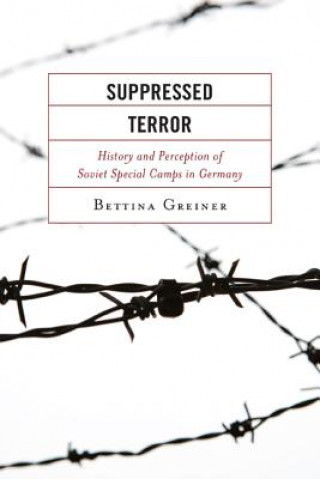
Code: 04669570
Suppressed Terror
by Bettina Greiner
At the end of World War II, the Soviet secret police installed ten special camps in the Soviet occupation zone, later to become the German Democratic Republik. Between 1945 and 1950, roughly 154,000 Germans were held incommunicado ... more
- Language:
 English
English - Binding: Hardback
- Number of pages: 418
Publisher: Lexington Books, 2014
- More about this

You might also like
-

Price Guide to Rookwood
19.04 € -26 % -

AI and Cognitive Science '89
58.35 € -

Japanese Chronicles
15.03 € -18 % -

Alicyclic Chemistry
470.49 € -

Crisis Communications
157.73 € -

Rural Gender Relations
189.21 € -

Wisden Collector's Guide
61.66 €
Give this book as a present today
- Order book and choose Gift Order.
- We will send you book gift voucher at once. You can give it out to anyone.
- Book will be send to donee, nothing more to care about.
More about Suppressed Terror
You get 473 loyalty points
 Book synopsis
Book synopsis
At the end of World War II, the Soviet secret police installed ten special camps in the Soviet occupation zone, later to become the German Democratic Republik. Between 1945 and 1950, roughly 154,000 Germans were held incommunicado in these camps. Whether those accused of being Nazis, spies, or terrorists were indeed guilty as charged, they were indiscriminately imprisoned as security threats and denied due process of the law. One third of the captives did not survive. To this day, most Germans have no knowledge of this postwar Stalinist persecution, even though it exemplifies in a unique way the entangled history of Germans as perpetrators and victims. How can one write the history of victims in a "society of perpetrators?" This is only one of the questions Displaced Terror: History and Perception of Soviet Special Camps in Germany raises in exploring issues in memory culture in contemporary Germany. The study begins with a detailed description of the camp system against the backdrop of Stalinist security policies in a territory undergoing a transition from war zone to occupation zone to Cold War hot spot. The interpretation of the camps as an instrument of pacification rather than of denacification does not ignore the fact that, while actual perpetrators were a minority, the majority of the special camp inmates had at least been supporters of Nazi rule and were now imprisoned under life-threatening conditions together with victims and opponents of the defeated regime. Based on their detention memoirs, the second part of the book offers a closer look at life and death in the camps, focusing on the prisoners' self-organization and the frictions within these coerced communities. The memoirs also play an important role in the third and last part of the study. Read as attempts to establish public acknowledgment of violence suffered by Germans, they mirror German memory culture since the end of World War II.
 Book details
Book details
Book category Books in English Humanities History Regional & national history
187.51 €
- Full title: Suppressed Terror
- Author: Bettina Greiner
- Language:
 English
English - Binding: Hardback
- Number of pages: 418
- EAN: 9780739177433
- ISBN: 0739177435
- ID: 04669570
- Publisher: Lexington Books
- Weight: 758 g
- Dimensions: 162 × 237 × 40 mm
- Date of publishing: 01. May 2014
Trending among others
-

The Fourth Turning
20.65 € -1 % -

Ethnic Cleansing of Palestine
12.93 € -24 % -

Forbidden Archeology
35.89 € -20 % -

Beyond Band of Brothers
15.13 € -28 % -

Rise And Fall Of The Third Reich
21.95 € -21 % -

Strange Death of Europe
22.45 € -22 % -

Bushido, the Soul of Japan
13.43 € -2 % -

Strange Death of Europe
16.54 € -15 % -

History of the Peloponnesian War
16.94 € -19 % -

Levant
15.13 € -28 % -

Serbs
22.65 € -5 % -

Road To Stalingrad
13.23 € -27 % -

Benjamin Franklin
18.64 € -11 % -

Children of Ash and Elm
16.94 € -20 % -

Slightly Out of Focus
15.03 € -21 % -

Great Game
15.13 € -28 % -

Socialism Betrayed
19.04 € -19 % -

Time Traveller's Guide to Restoration Britain
13.13 € -28 % -

Private Lives of the Tudors
15.23 € -22 % -

Czechoslovakia
22.85 € -

Life on the Mississippi
10.72 € -16 % -

Persian Fire
14.43 € -21 % -

Cambridge Illustrated History of France
44.61 € -10 % -

To Hell and Back
14.43 € -28 % -

Biblical World
29.97 € -25 % -

What Has Government Done to Our Money?
8.71 € -22 % -

Narrative of the Life of Frede
4.60 € -28 % -

History of Belarus
25.16 € -17 % -

British Battle Tanks
29.97 € -28 % -

Native American History
15.53 € -18 % -

With the Old Breed
15.63 € -25 % -

Czechs and the Lands of the Bohemian Crown
27.37 € -

Budweisers into Czechs and Germans
55.14 € -

Russia under Tsarism and Communism 1881-1953 Second Edition
48.32 € -

Austro-Prussian War
29.37 € -17 % -

Battle for Spain
16.54 € -21 % -

Shah of Shahs
10.22 € -28 % -

Hidden Power
42.91 € -4 % -

Badges and Uniforms of the Royal Air Force
15.13 € -28 % -

Stalin's Englishman: The Lives of Guy Burgess
12.73 € -18 % -

Vision of Yemen
33.78 € -

Europe
36.19 € -13 % -

British History For Dummies 3e
18.34 € -12 % -

Fatimid Caliphate
58.35 € -

How The Irish Saved Civilization
11.22 € -28 % -

Fascist Italy
46.32 € -

Weimar and Nazi Germany
35.59 € -4 % -

Byzantine Art
25.26 € -14 % -

Babylonia: A Very Short Introduction
9.22 € -28 %
Collection points Bratislava a 2642 dalších
Copyright ©2008-24 najlacnejsie-knihy.sk All rights reservedPrivacyCookies



 15549 collection points
15549 collection points Delivery 2.99 €
Delivery 2.99 € 02/210 210 99 (8-15.30h)
02/210 210 99 (8-15.30h)